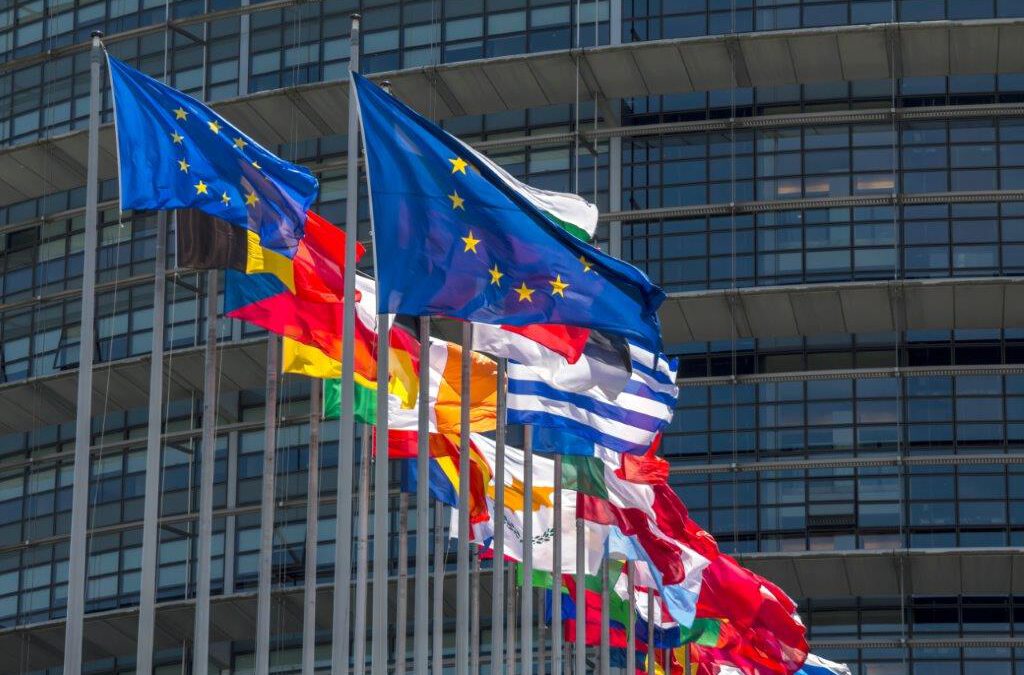The Communion of Protestant Churches in Europe (CPCE) is hoping for a “fair debate about Europe’s future” in the run-up to the European elections in June 2024 and is calling for candidates who seek good cooperation across borders rather than polarisation. The CPCE Council has adopted the following statement. PDF versions of the statement can be found below in English, German, and French:
European elections
current challenges call for responsibility and hope
The tenth elections to the European Parliament will take place from 6 to 9 June 2024. Citizens of the EU member states can cast their vote for the world’s only directly elected parliament that steers the fate of many countries. The Communion of Protestant Churches in Europe would like to make its voice heard and encourage everyone to take part in the European elections and play a constructive role in shaping European democracy. An improved voter turnout would be a good sign for Europe’s future.
Bringing hope to Europe
By taking part in the European elections, each and every individual can take responsibility for a democratic Europe and thus spread hope. We support politicians and all those in civil society who are committed to the EU as a community of values and solidarity. Together, we stand for a diverse, sustainable and social Europe.
We are deeply concerned by the current situation in Europe with rising populism and polarization in societies. Even beyond the elections, we want to campaign against all forms of extremism, racism, antisemitism and nationalism. Balancing interests, participation and peaceful coexistence across borders are important to us.
The Communion of Protestant Churches in Europe is currently preparing its General Assembly in Sibiu/Hermannstadt/Nagyszeben, Romania. Churches of all sizes form a diverse communion of 96 member churches that liaises between East and West, North and South, across Europe. We experience that through discussion, confrontation with each other and the joint search for compromise we continue to grow together. Inspired by the biblical letter to the Ephesians, the theme of the General Assembly is: “In the Light of Christ – Called to Hope”. We want to bring the hope that comes with these experiences to Europe, leading to improvements in living alongside one another.
European challenges need European solutions
These European elections will be of enormous importance for the future of Europe. The EU is not only based on mutual economic benefits and a common market, but also on the willingness to provide support and mutual solidarity in times of crisis. In this European election year, we are aware of a variety of challenges such as climate change, war, migration, social inequality and economic recession. All of these challenges do not stop at national borders and have a global dimension. Solutions on the European level are needed more than ever.
- Pan-European efforts are needed to tackle the global challenge of man-made climate change and achieve a just transition to a climate-neutral society within the EU.
- The fight for social equality in the EU must continue through the harmonisation of social standards and a comprehensive cohesion policy.
- According to the UNHCR, there are roughly 110 million refugees worldwide. An asylum and migration policy based on solidarity with high protection and reception standards can provide an answer to the current migration movements.
- The Russian war of aggression against Ukraine, which violates international law, calls for a joint European response as well as humanitarian, military and financial support.
- The EU must meet the challenges posed by digitalisation and artificial intelligence. A dialogue involving Christian anthropology and risk-based legislation could pose solutions.
- Political polarisation continues, often manifesting itself in anti-European and anti-democratic populism. European institutions are called upon to strengthen democracy and the rule of law.
Candidates should be judged by the extent to which they contribute to constructive European solutions. A return to nationalism will not help to meet the current challenges in the long term.
Taking responsibility for Europe as a peace project
As the Communion of Protestant Churches in Europe, we are grateful that the enmities of the First and Second World Wars have been overcome. Our communion was formed in 1973 under the formula ‘reconciled diversity’. Since then, we have deepened our church communion and thus promoted unity. In this way, we also serve society. Together we reflect on the challenges facing society and our mission, as we did during the Covid-19 pandemic.[1]
We want to continue to take responsibility for Europe as a peace project and actively promote and help shape it through our activities and initiatives. Christians are called upon to love God and their neighbour. In loving God and our neighbour, we are also called upon to account for this when looking towards the political landscape and where we cast our votes. We encourage our member churches throughout Europe to create spaces for opinion-building and encounter with politicians.
This year’s European elections will be landmark elections. In this election year, practising love for our neighbour therefore means meeting our counterparts in a friendly manner, seeking a fair debate about Europe’s future. We may argue with each other, but not in ways that lead to public polarization. With this attitude, we want to contribute to a peaceful and respectful discourse in Europe. We also expect this attitude from those who bear political responsibility. As Europeans, we have the opportunity this June to elect politicians with this attitude. May we take this opportunity as Europe enters its newest chapter.
The Council of the Communion of Protestant Churches in Europe
Reutlingen/Vienna, February 2024
[1] Communion of Protestant Churches in Europe CPCE, “Being church together in a pandemic” – Reflections from a Protestant Perspective. Vienna, February 2021
